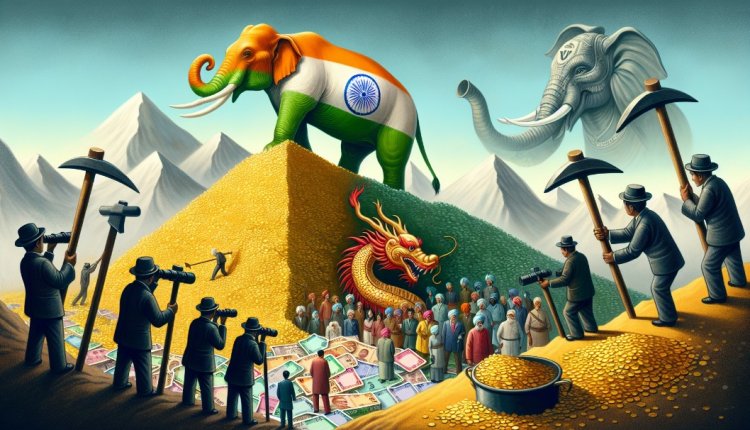China's Economic Decline and India's Rise as an Investment Destination
Shifting tides in Asia! Explore China's economic slowdown & India's rise as a compelling investment destination. Analyze growth drivers, challenges, & investment opportunities. Understand the evolving landscape & make informed decisions.

Introduction
In the stock market, there are two types of leaders: bulls and bears. Bulls are individuals who drive the economy to new heights, while bears are more cautious and sceptical. Chinese President Xi Jinping considers himself a bull, aiming to propel the Chinese economy forward. However, recent events have exposed his limitations.
With panic gripping Beijing, many investors are fleeing China and selling off their Chinese stocks. In less than three years, China has suffered a loss of $7 trillion in market value. Last week alone, there was a sell-off that resulted in almost $2 trillion in losses. The severity of the situation cannot be ignored, and President Xi Jinping has finally taken action.
Xi Jinping called a meeting with Chinese regulators to address the growing concerns and find ways to improve global sentiment about China's deteriorating economy. While the outcome of the meeting is yet to be announced, its news alone initially boosted Chinese markets. However, major investors do not seem impressed and are losing patience. As a result, they are moving their money to India.
India has become an attractive investment destination for billions of dollars in Indian stocks. Wall Street banks are placing bigger bets on India, and there is a noticeable gold rush happening. Investors are increasingly preferring India over China for several reasons.
Reasons for Investors Preferring India over China
-
India has consistently proven to be a driver of growth, while China's economic performance has raised concerns.
-
China has developed a serious perception problem and is no longer seen as an investor-friendly destination.
-
Both foreign and local investors in China are dissatisfied, leading to a shift of investment to India.
-
Indian stocks have received robust inflows of foreign investment, indicating confidence in India's growth prospects.
-
Goldman Sachs and Morgan Stanley, two leading Wall Street banks, have endorsed India as a prime investment destination for the next decade.
-
India is projected to become the third-largest economy by 2027, following the United States and China, according to Morgan Stanley.
-
Despite potential price corrections in Indian stocks, the overall trajectory remains positive, and more people are buying into India's growth story.
Chinese Citizens' Unhappiness and Criticism on Social Media
Amidst the economic decline in China, Chinese citizens are expressing their unhappiness and criticism on social media platforms like Weibo. One of the ways they vent their frustrations is by posting criticisms on the US Embassy's Weibo account. This unconventional strategy allows them to escape Chinese censorship, as commenting on someone else's post has a lesser chance of being discovered.
The overwhelming number of comments on the US Embassy's Weibo account demonstrates how unhappy Chinese citizens are with their country's economic policies. In fact, on one particular post, there were over 100,000 comments, showcasing the sheer magnitude of the discontent.
Here are some examples of critical comments made by Chinese users:
-
"Could you spare us some missiles to bomb away the Shanghai stock exchange?"
-
"The Weibo account of the US Embassy in China has become the Wailing Wall of Chinese retail equity investors."
These comments not only highlight the frustration of Chinese citizens but also reveal their dissatisfaction with the ongoing meltdown in their markets. For the past six months, investors have been selling Chinese stocks in large numbers, with global funds selling Chinese stocks worth $2 billion last month alone.
The weakening Chinese economy is facing multiple challenges, including a failing property sector and a contracting manufacturing sector. Factory output has declined for the fourth straight month, indicating a slowdown in manufacturing. China's official data also confirms the shrinking of the manufacturing sector.
All of these factors contribute to the perception that China is becoming "uninvestable." As a result, investors are looking for alternatives, and India has emerged as a prime investment destination. Goldman Sachs and Morgan Stanley, two leading Wall Street banks, have endorsed India as the preferred investment destination for the next decade.
Last year, the Indian stock market received $20 billion from foreign investors, indicating confidence in India's growth prospects. While Indian stocks may be considered overpriced and a price correction is expected, the overall trajectory remains positive. More people are buying into India's growth story, solidifying its position as an attractive investment destination.
In contrast, China will need to take concerted action to win back investors and reverse its economic decline. Short-term measures and assurances will no longer be enough. The responsibility falls on President Xi Jinping to address the concerns and restore investor confidence in China's markets.
China's Economic Challenges and Decline
China's economy is currently facing multiple challenges that have led to its decline in recent years. The weakening property and manufacturing sectors are major contributors to this decline.
Factory output in China has declined for four consecutive months, indicating a significant slowdown in manufacturing. China's official data have confirmed this decline, which emphasises how the manufacturing sector is contracting.
Japan's largest investment bank, Nomura, has assessed that China's economic dip is ongoing and likely to worsen. This assessment is based on China's weakening economy and its multiple challenges, such as the failing property sector and contracting manufacturing sector.
These challenges have resulted in China being called 'uninvestable' by many investors. The perception of China as an investor-friendly destination has significantly declined, both for foreign and local investors. As a result, investors are seeking alternatives to China.
One alternative that has gained significant attention is India. Wall Street banks, such as Goldman Sachs and Morgan Stanley, have endorsed India as a prime investment destination for the next decade. They project robust inflows of foreign investment into the Indian stock market and predict that India will become the third-largest economy by 2027, following the United States and China.
Last year, India received $20 billion from foreign investors, indicating confidence in its growth prospects. While Indian stocks may be considered overpriced and a price correction is expected, the overall trajectory remains positive. More investors are buying into India's growth story.
In contrast, China needs to take concerted action to win back investors and reverse its economic decline. Short-term measures and assurances will no longer be enough. The responsibility falls on President Xi Jinping to address the concerns and restore investor confidence in China's markets.
India as an attractive investment destination
India has emerged as a highly attractive investment destination, drawing the attention of investors from around the world. Leading Wall Street banks Goldman Sachs and Morgan Stanley support this shift in focus from China to India.
Goldman Sachs and Morgan Stanley have highlighted India as a prime investment opportunity for the next decade. They project robust inflows of foreign investment into the Indian stock market, indicating confidence in India's growth prospects.
Morgan Stanley predicts that India will become the third-largest economy by 2027, following the United States and China. This projection further solidifies India's position as a key player in the global economy.
Foreign investors are increasingly favouring India over China for several reasons. First, India has consistently proven to be a driver of growth, while concerns have been raised about China's economic performance.
Furthermore, China has developed a serious perception problem and is no longer seen as an investor-friendly destination. Both foreign and local investors in China are dissatisfied, leading to a shift of investment to India.
Despite the potential for price corrections in Indian stocks, the overall trajectory remains positive. Indian stocks may be considered overpriced when compared to average prices from 2010 to 2020, with a 27% higher valuation. However, more people are buying into India's growth story, demonstrating their confidence in the country's long-term potential.
Investing in India is seen as buying into a compelling growth story. The country's economic growth and market inflows are attracting significant attention, making it an attractive investment destination.
Comparing India's growth prospects to China's decline, it is evident that China faces significant economic challenges. The weakening property and manufacturing sectors, along with a declining manufacturing output, have contributed to China's loss of investor confidence.
To reverse its economic decline and win back investors, China will need to take concerted action. Short-term measures and assurances will no longer be enough. The responsibility falls on President Xi Jinping to address concerns and restore investor confidence in China's markets.
In conclusion, India's rise as an investment destination is supported by the endorsement of Goldman Sachs and Morgan Stanley, as well as projections for India's economic growth and market inflows. While Indian stocks may be considered overpriced, the positive trajectory and confidence in India's growth story make them an attractive investment opportunity. On the other hand, China faces the task of winning back investors and reversing its economic decline.
Conclusion
China is currently facing a significant economic decline, which has led to a loss of investor confidence. President Xi Jinping must take concerted action to address these challenges and reverse the decline.
Investors are increasingly turning to India as an attractive investment destination. Wall Street banks, such as Goldman Sachs and Morgan Stanley, have endorsed India as a prime investment opportunity for the next decade. They project robust inflows of foreign investment into the Indian stock market, indicating confidence in India's growth prospects.
In contrast, China has developed a perception problem and is no longer seen as an investor-friendly destination. Both foreign and local investors are dissatisfied, leading to a shift of investment to India.
Last year, India received $20 billion from foreign investors, further solidifying its position as a key player in the global economy. While Indian stocks may be considered overpriced, the overall trajectory remains positive, and more investors are buying into India's growth story.
In order to win back investors and reverse its economic decline, China must go beyond short-term measures and assurances. President Xi Jinping holds the responsibility of addressing concerns and restoring investor confidence in China's markets.



 admin
admin 










